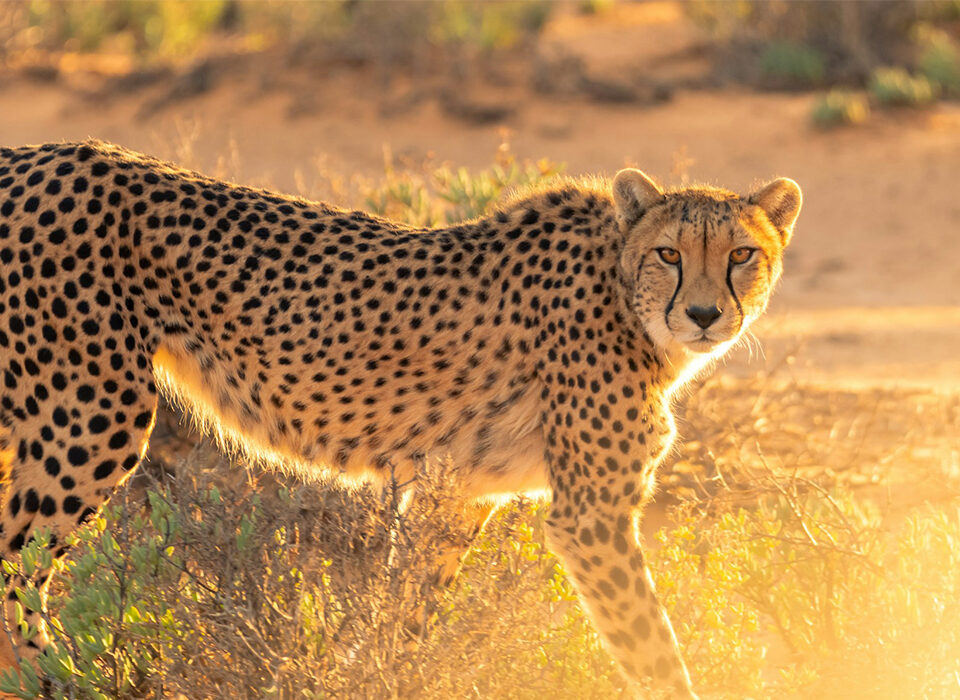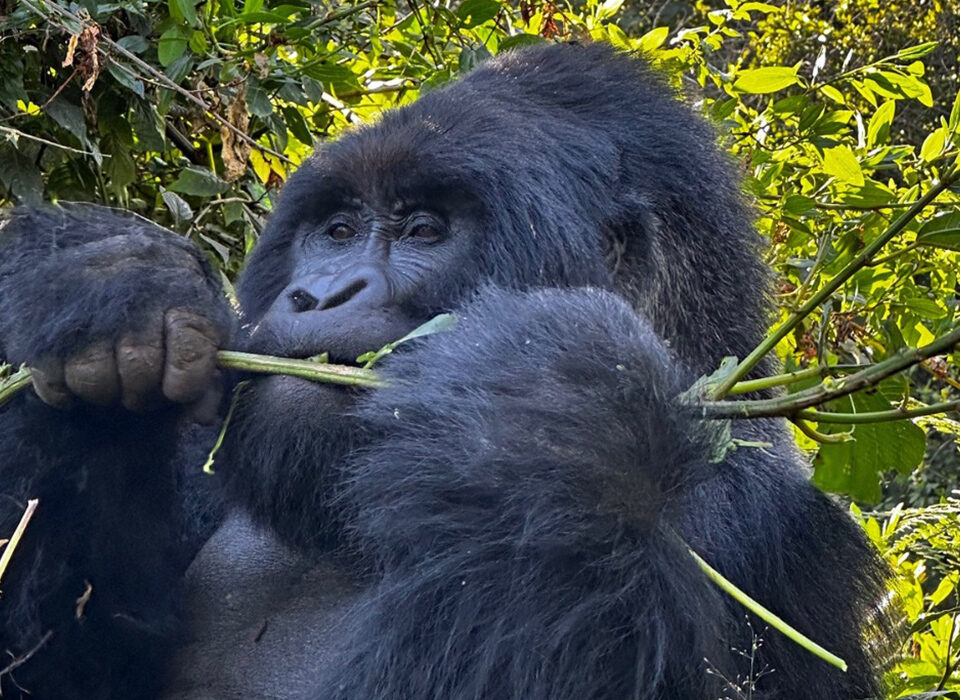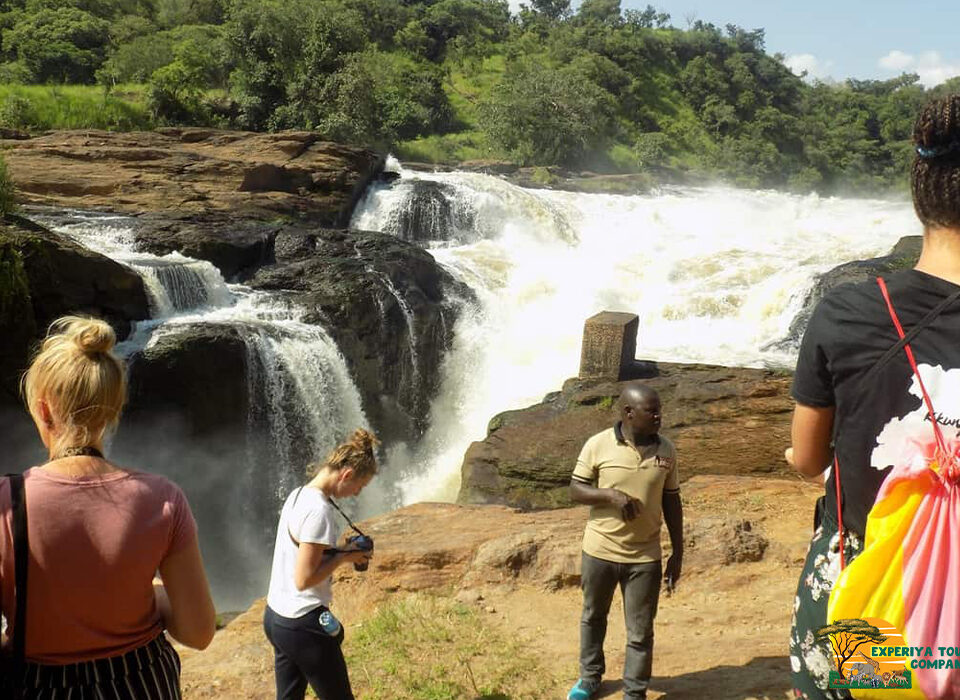
Top Islands to Visit on Lake Victoria – Explore Ssese, Bulago & Ngamba with Experiya Tour Company
October 25, 2025
Best Locations for Scenic Photography in Uganda – Explore with Experiya Tour Company
October 25, 2025Fishing in Uganda’s Great Lakes – Best Spots, Seasons & Experiences with Experiya Tour Company
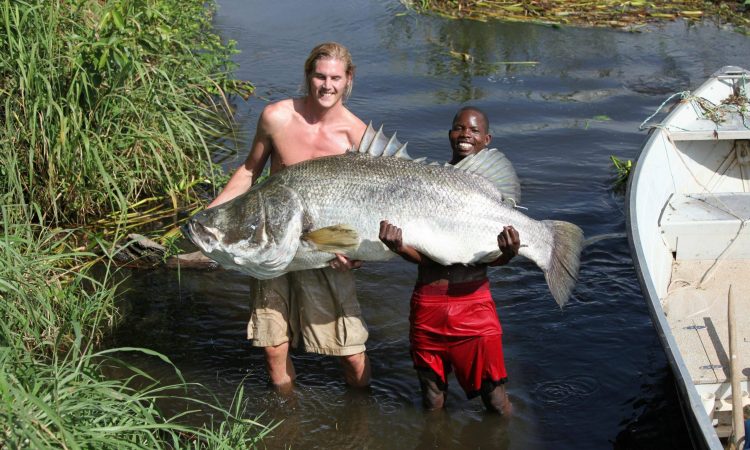
Can I Go Fishing in Uganda’s Great Lakes?
Uganda, famously known as the “Pearl of Africa,” is a land blessed with an extraordinary abundance of water. Nearly one-fifth of the country’s total area is covered by lakes, rivers, and wetlands — a mosaic of shimmering blue that defines its landscape and sustains its people. Among these, the Great Lakes stand out not just for their size, but for their beauty, biodiversity, and cultural significance. From the vast expanse of Lake Victoria to the dramatic waters of Lake Albert, Lake Edward, and Lake Kyoga, Uganda offers some of the finest freshwater fishing opportunities in all of Africa.
So, can you go fishing in Uganda’s Great Lakes? Absolutely — and it’s one of the most rewarding experiences you can have in this country. Whether you’re an experienced angler seeking a challenge or a curious traveler looking for a relaxing day on the water, Uganda’s Great Lakes deliver an unforgettable fishing adventure surrounded by breathtaking scenery and abundant wildlife.
This blog explores everything you need to know about fishing in Uganda’s Great Lakes: the best spots, the types of fish you can catch, the ideal seasons, and why this experience is one of the country’s best-kept secrets.
Uganda’s Great Lakes – A Natural Treasure
Uganda lies within Africa’s Great Lakes region, sharing some of the continent’s most iconic water bodies. The four main Great Lakes that dominate its geography are Lake Victoria, Lake Albert, Lake Edward, and Lake Kyoga. Each of these lakes is unique, offering different fishing experiences, species, and cultural encounters.
Fishing is deeply rooted in Uganda’s traditions — it’s both a livelihood and a way of life for many local communities. But beyond its economic value, fishing here also connects travelers to the rhythms of nature, offering peaceful moments on vast waters framed by rolling hills, islands, and forested shores.
1. Lake Victoria – The Giant of African Lakes
As the largest lake in Africa and the second-largest freshwater lake in the world, Lake Victoria is Uganda’s crown jewel for fishing enthusiasts. Stretching across Uganda, Kenya, and Tanzania, it covers an incredible 68,800 square kilometers, with Uganda possessing nearly half of its surface area.
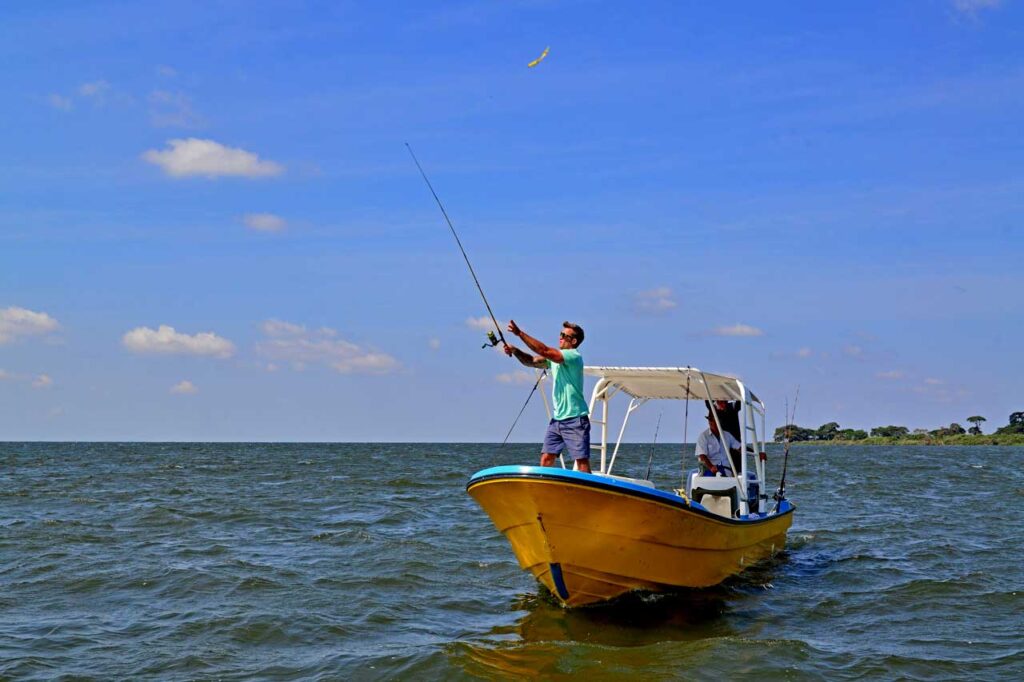
What Makes Lake Victoria a Fishing Paradise
Lake Victoria is home to over 200 fish species, but the star attraction for anglers is the Nile perch, a massive predator that can weigh up to 100 kilograms (220 pounds). These freshwater giants offer one of the most thrilling fishing challenges in Africa. In addition to Nile perch, the lake also teems with tilapia, catfish, and various lungfish and barbel species.
Popular Fishing Areas on Lake Victoria
The Ugandan side of Lake Victoria offers several great fishing locations:
- Entebbe: The main gateway for fishing trips. From Entebbe’s calm shores, you can embark on guided fishing expeditions to deeper waters where Nile perch thrive.
- Ssese Islands: This tropical archipelago of 84 islands offers a stunning fishing escape. The waters around Buggala Island and Banda Island are particularly good for catching perch and tilapia.
- Jinja: At the source of the Nile, the lake narrows into the river, offering rich fishing grounds for both sport and local fishermen.
Fishing Experience
Fishing trips on Lake Victoria are usually conducted by motorized boats equipped with rods, bait, and safety gear. You can choose between half-day, full-day, or multi-day fishing safaris. The thrill of reeling in a giant Nile perch is matched only by the stunning scenery around you — islands, sunsets, and the calls of African fish eagles overhead.
Best Time to Fish
Fishing on Lake Victoria is good year-round, but the best months are December to March and June to October, when the waters are calm and fish are more active.
2. Lake Albert – The Wild Frontier
Lying between Uganda and the Democratic Republic of Congo, Lake Albert is a long, narrow lake set within the dramatic Albertine Rift Valley. Framed by the Rwenzori Mountains to the south and the Blue Mountains of Congo to the west, this lake offers not just excellent fishing, but also some of the most scenic landscapes in East Africa.
What You Can Catch
Lake Albert is rich in fish species, with Nile perch and tilapia again taking the spotlight. The lake is also known for its African tiger fish, famous for their sharp teeth and fighting spirit, making them a favorite among sport fishermen.
Where to Fish
The best fishing spots are near Butiaba, Buliisa, and Pakwach — areas with historical ties to early explorers like Samuel Baker, who passed through here in the 19th century. Fishing here offers not only sport but also a connection to Uganda’s exploration heritage.
Why It’s Special
Lake Albert’s fishing experience feels wilder and more remote than Lake Victoria’s. It’s common to spot hippos, crocodiles, and elephants along the shoreline, especially in sections bordering Murchison Falls National Park. Combining a fishing expedition with a wildlife safari here is an unbeatable adventure.
3. Lake Kyoga – Uganda’s Hidden Gem
Located in central Uganda, Lake Kyoga is a vast, shallow lake connected to both Lake Victoria and Lake Albert through the Nile River system. Although less visited by tourists, it offers rich fishing grounds and authentic cultural experiences.
Fishing Highlights
Lake Kyoga’s waters are abundant with tilapia, catfish, and Nile perch, though the fish tend to be smaller than those in deeper lakes. The lake’s network of papyrus-lined channels and lagoons also makes it a prime spot for birdwatching, with frequent sightings of African jacanas, kingfishers, and even the rare shoebill stork.
Local Experience
Fishing around Lake Kyoga is mostly artisanal, carried out by local communities using traditional boats and handmade nets. Joining local fishermen for a morning catch offers an authentic and educational experience, blending cultural exchange with nature exploration.
Accessibility
The lake is accessible from Soroti or Lira, and while it lacks luxury lodges, its peaceful atmosphere and rural charm make it ideal for travelers seeking something off the beaten path.
4. Lake Edward – The Wildlife Lake
Nestled within the western arm of the Great Rift Valley, Lake Edward straddles the border between Uganda and the Democratic Republic of Congo. It forms part of the Queen Elizabeth National Park ecosystem, making it one of the most scenic lakes in Africa.
Fishing in a Wildlife Paradise
Fishing on Lake Edward is unique because it takes place within one of Uganda’s most biodiverse regions. The lake is surrounded by savannah plains teeming with elephants, buffaloes, and hippos, and the nearby Kazinga Channel hosts hundreds of water birds.
The main species caught here are Nile tilapia, catfish, and lungfish, which support local fishing villages along the shore. For sport anglers, fishing on Lake Edward can be combined with a safari in Queen Elizabeth National Park, creating a perfect mix of adventure and relaxation.
The Kazinga Channel Connection
The Kazinga Channel, which links Lake Edward and Lake George, also provides excellent fishing and boating opportunities. This 40-kilometer natural waterway is famous for its dense populations of hippos, crocodiles, and water birds — a truly unforgettable sight during a day of fishing.
Fishing Seasons and Regulations
Fishing in Uganda’s Great Lakes can be done year-round, but certain months provide better conditions depending on water levels and weather patterns.
The best fishing months are generally from December to March and June to October, when the weather is dry, and the water is clear. These conditions make fish more active and improve visibility for spotting movements on the lake surface.
Uganda’s fisheries are regulated to ensure sustainability. Licensed operators follow responsible fishing practices, focusing on catch-and-release for large Nile perch and using appropriate gear to minimize environmental impact. Travelers are encouraged to book fishing trips with certified guides who know the lakes and their ecosystems well.
Combining Fishing with Other Adventures
One of the joys of fishing in Uganda is how easily it blends with other activities. You can:
- Combine fishing on Lake Victoria with a visit to Ngamba Island Chimpanzee Sanctuary.
- Pair fishing on Lake Albert with a wildlife safari in Murchison Falls National Park.
- Add birdwatching, island-hopping, or cultural tours to your fishing expedition.
Uganda’s Great Lakes offer far more than just fishing — they provide a full immersion into the natural heartbeat of the country.
What to Bring for Your Fishing Trip
- Light, breathable clothing and a hat for sun protection.
- Sunscreen and insect repellent.
- A camera to capture both your catch and the lake’s beauty.
- Binoculars for spotting birds and wildlife along the shore.
- Waterproof gear, especially during the rainy season.
Most guided tours provide fishing rods, bait, life jackets, and refreshments, so you only need to show up ready for adventure.
Go Fishing in Uganda’s Great Lakes with Experiya Tour Company
Fishing in Uganda’s Great Lakes is more than a sport — it’s a journey into nature’s soul. From the massive Nile perch of Lake Victoria to the tranquil channels of Lake Kyoga and the wildlife-framed waters of Lake Albert and Edward, each lake tells its own story and offers a unique experience.
To make the most of your adventure, travel with Experiya Tour Company, Uganda’s trusted specialist in safari and adventure travel. Experiya offers customized fishing tours across the Great Lakes, complete with professional guides, well-equipped boats, accommodation arrangements, and cultural add-ons like island visits and community experiences. Whether you want a full-day fishing excursion from Entebbe or a multi-day safari combining fishing and wildlife exploration, Experiya handles all logistics seamlessly so you can focus on the thrill of the catch.
With Experiya, your fishing trip becomes more than just an excursion — it becomes a story of discovery, relaxation, and connection with Uganda’s Great Lakes.

